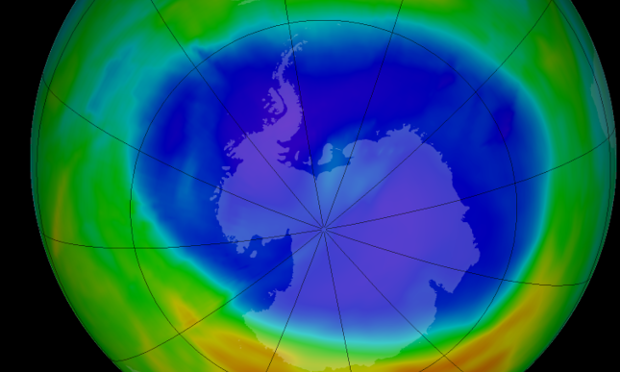 Scientists, environmentalists and world leaders alike have generally agreed that capping Earth’s temperature rise at 2 degrees Celsius would prevent the worst effects of climate change — a cut-off touted again in the latest report by the Intergovernmental Panel on Climate Change (IPCC).
Scientists, environmentalists and world leaders alike have generally agreed that capping Earth’s temperature rise at 2 degrees Celsius would prevent the worst effects of climate change — a cut-off touted again in the latest report by the Intergovernmental Panel on Climate Change (IPCC).
But many experts in the field, including former IPCC leaders, have said that even if global warming is kept to that limit, such a rise could nevertheless devastate the environment and endanger humanity — the very effects that the latest study warns will happen if the 2 C ceiling is breached.
Capping warming at 2 C not enough to avert disaster, climate experts warn
The Climate-Change Solution No One Will Talk About
 The equation seems fairly simple: The more the world's population rises, the greater the strain on dwindling resources and the greater the impact on the environment.
The equation seems fairly simple: The more the world's population rises, the greater the strain on dwindling resources and the greater the impact on the environment.
The solution? Well, that's a little trickier to talk about.
Public-health discussions will regularly include mentions of voluntary family planning as a way to reduce unwanted pregnancies and births. But, said Jason Bremner of the Population Reference Bureau, those policies can also pay dividends for the environment.
"And yet the climate-change benefits of family planning have been largely absent from any climate-change or family-planning policy discussions," he said.
Ozone hole remains size of North America, Nasa data shows
 The Antarctic ozone hole, which was expected to reduce in size swiftly when manmade chlorine emissions were outlawed 27 years ago, is stubbornly remaining the size of North America, new data from Nasa suggests.
The Antarctic ozone hole, which was expected to reduce in size swiftly when manmade chlorine emissions were outlawed 27 years ago, is stubbornly remaining the size of North America, new data from Nasa suggests.
The hole in the thin layer of gas, which helps shield life on Earth from potentially harmful ultraviolet solar radiation that can cause skin cancers, grows and contracts throughout the year but reached its maximum extent on 9 September when monitors at the south pole showed it to cover 24.1m square km (9.3m sq miles). This is about 9% below the record maximum in 2000 but almost the same as in 2010, 2012 and 2013.
Hundreds of thousands of gallons of oil from BP spill may be on the ocean floor
 Over 5 million barrels of oil was released into the ocean during the BP Deepwater Horizon oil spill, and up to 620,000 barrels may now be on the ocean floor, a new study finds.
Over 5 million barrels of oil was released into the ocean during the BP Deepwater Horizon oil spill, and up to 620,000 barrels may now be on the ocean floor, a new study finds.
The study, done by geochemists at the University of California, Santa Barbara, looked at sediment samples from the Gulf of Mexico and located evidence of the chemical Hopane, which indicates the presence of crude oil. It was known that 2 million barrels of the 5 million barrels spilled had not been collected, and the researchers determined between 4 and 31 percent of the 2 million barrels has reached the ocean floor.
Colombian farmers sue BP for $29M over alleged land degredation
 Colombian farmers took on oil giant BP in the British High Court on Wednesday, in a lawsuit that alleges that the company negligently managed the construction of a pipeline in the mid-1990s, resulting in severe damage to their land.
Colombian farmers took on oil giant BP in the British High Court on Wednesday, in a lawsuit that alleges that the company negligently managed the construction of a pipeline in the mid-1990s, resulting in severe damage to their land.
The four-month trial marks the first time the U.K. firm has faced a domestic court over its actions overseas in what is being billed as one of the largest environmental case of its kind.
Lego To Scrap Shell Deal After Arctic Drilling Protests
Danish toy maker Lego said Thursday it won't renew a deal allowing Shell to hand out Lego sets at its gas stations in some 30 countries, following a viral campaign protesting Arctic drilling.
Environmental activists Greenpeace launched in July a video showing an Arctic landscape with a Shell drilling platform made of Lego bricks covered in oil.
Lego CEO Joergen Vig Knudstorp said the protest "may have created misunderstandings among our stakeholders," adding the company didn't want to be embroiled in the environmental campaign.
Strongest 2014 Storm Churns Without Getting Closer Look
 The strongest tropical system the Earth has produced in almost a year is now churning in the Pacific Ocean on a track toward Japan.
The strongest tropical system the Earth has produced in almost a year is now churning in the Pacific Ocean on a track toward Japan.
Super Typhoon Vongfong’s exact strength may never be known. Yesterday, the best estimate pegged its winds at just over 178 miles (286 kilometers) per hour, according to the U.S. Navy Joint Typhoon Warning Center in Pearl Harbor, Hawaii.
More Articles...
- Dukesville, NC: Don’t drink the water, locals and activists warn
- Earthquake Rattles Wichita, Tulsa; 4.4-Magnitude Tremor Felt Widely in Kansas, Oklahoma
- U.S. Appeals Court Orders Disclosure of Secrets in Chevron Oil Pollution Case
- EU climate change chief: Obama has six months to take substantial action
Page 37 of 202

 Environmental Glance
Environmental Glance






























